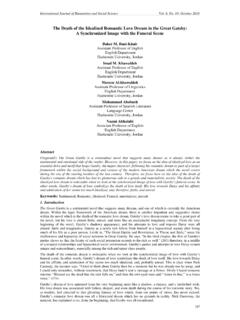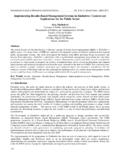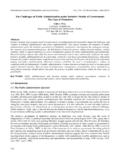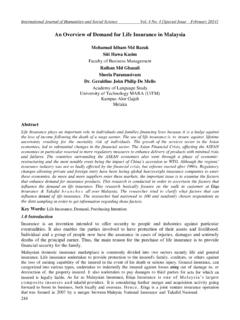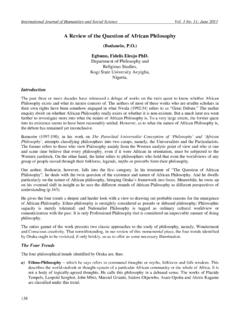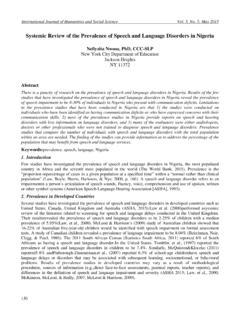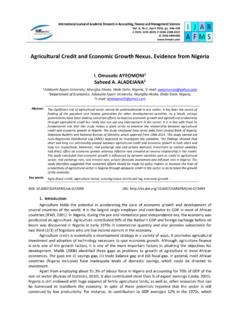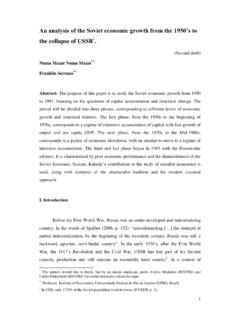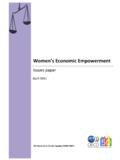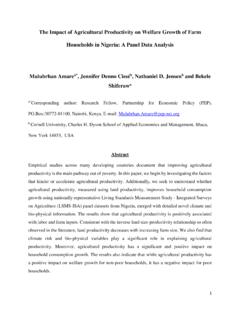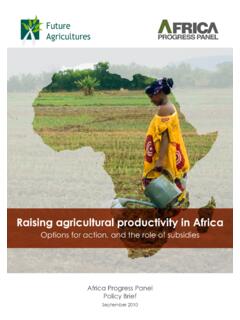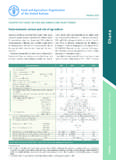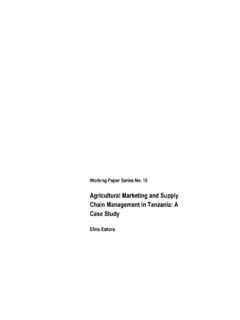Transcription of Farmers’ Cooperatives and Agricultural Development in ...
1 International Journal of Humanities and Social Science Vol. 4, No. 7(1); May 2014. farmers ' Cooperatives and Agricultural Development in Kwali Area Council Federal Capital Territory Abuja, Nigeria Yamusa Innocent Adefila, J. O. Department of Geography Ahmadu Bello University Zaria, Nigeria Abstract Cooperatives as self-help organization have been contributing significantly to economic growth and Development in terms of empowering poor people and creates enabling environment to participate actively in economic process in the areas of providing job opportunities, increasing accessibility to credit facilities and providing social protection. The study aimed at evaluating the influence of farmers ' Cooperatives on Agricultural Development , the socio-economic traits, perception of the members and the constraints to cooperation in Kwali area council, FCT Abuja, Nigeria.
2 Primary data were generated through the administration of structured questionnaire among 270 respondents using purposive sampling technique. Focus group discussion (FGD) was also employed to augment the research instrument. Secondary data were generated from official gazettes, research reports, journals, books and documented materials. Descriptive statistics such as averages, frequency, mean and percentages were used to summarize the data. In addition, Chi square (Z ) statistics was used to measure the effects of Cooperatives on Agricultural Development . The result showed p-values for level of education ( ), co-operative experience ( ) and family size ( ) having some significant difference with Agricultural Development at alpha level.
3 On the basis of the findings, one recommends among other things, there should be adequate provision for basic infrastructural facilities such as all-weather roads, electricity and water in the rural areas. Also, government should support farmers ' co-operatives with regulatory and administrative framework to ensure satisfactory service delivery to the society. The study concludes that, though farmers ' co-operatives have the potential to make maximum contribution to Agricultural Development , there is need to organize for them training and re-training programmes through workshops, seminars and conferences so as to enhance capacity building and acquisition of necessary managerial skills.
4 Keywords: Cooperatives farmers Role Agriculture Development 1. Introduction Despite the significance of the Agricultural sector, its performance over some decades has been rather disappointing in view of its low productivity. However, if the country has to feed, reduce abject poverty and attain a satisfactory level of sustainable economic growth, the poor performance in the Agricultural sector should be addressed. Agriculture remains the main stay of the rural economy in Nigeria as it provides employment for about 70% of the work force. However, less than 50% of the country's cultivable Agricultural land is under cultivation because small-holders' farmers often use rudimentary production techniques to cultivate most of the land thereby resulting in low productivity (Manyong et al, 2005).
5 The small-holder farmers are constrained by many problems including those of poor access to modern inputs, inadequate credit facilities, poor infrastructure, inadequate access to markets, environmental degradation, and inadequate Agricultural extension services (Venerakumaran, et al, 2005). In an effort to overcome some of these issues, donor agencies and governments have re-emphasized co- operatives as a strategy to promote collective action to strengthen small-holders' livelihoods by linking them to national and international markets. Co-operatives are autonomous associations of persons who unite voluntarily to meet their common economic and social needs through a jointly owned and democratically controlled enterprise (ICA, 1995).
6 161. Center for Promoting Ideas, USA Co-operatives are established by like-minded persons to pursue mutually beneficial economic interest and they provide a unique tool for achieving one or more economic goals in an increasingly competitive global economy. Adedayo and Yusuf (2004) highlighted some of the goals to include: achieving economy of size, improving bargaining power when dealing with other business, purchasing in bulk to achieve lower prices and obtaining products and services otherwise unavailable. Cooperatives are seen as a medium through which services like provision of farm input, farm implements, farm mechanization, Agricultural loans, Agricultural extension, members education, marketing of members farm produce and other economic activities and services are rendered to members (Akinwumi, 2006; Bhuyam, 2007)).
7 Grounded in theories of social cohesion and social capital, farmer co-operatives provide small-holder farmers with economies of scale by facilitating cheaper and more efficient access to inputs, improved production techniques, and information about markets. Today in an era where many small-holder farmers feel powerless to change their lives, co-operatives can serve as a strong, vibrant and viable economic alternative. Bibby and Shaw (2005) noted that Cooperatives are based on the powerful idea that togetherness of people can achieve goals that none of them can achieve individually. It has been considered as a third force, an alternative and countervailing power to both big business and government (ICA, 1995).
8 Agricultural co-operatives encourage members to engage in joint cultivation of food and cash crops, purchase farm inputs at subsidized price and create better producers' price for their farm products (Poulton, et al 2006). In view of the low financial capacity and high level of under- Development , an individual farmer cannot achieve the desires for large-scale production. It is therefore in the farmers ' interest that resources are pulled together so as to gain a tremendous collective advantage and thus widening the industrial base of the economy and the management techniques (Epetimehin, 2006). For instance, farmers ' co-operative societies are formed to bring in more Agricultural inputs and product marketing services to members, increase competition in the Agricultural service sector and provide savings and credit to members, among many other functions.
9 Small holder farmers stand a better chance with the formation of Agricultural co-operatives. International organizations such as the United Nations (UN), the World Bank and the International Labour Organization (ILO) are convinced that Agricultural Cooperatives can play a vital role in achieving sustainable rural Development . ILO (2003) noted that co-operatives are by nature concerned with democratic and human values as well as caring for the environment. Furthermore co-operatives are catalysts for social organization and cohesion (Calkins and Ngo, 2005). The cardinal objectives of co-operatives also include contributions to sustainable Development , employment and creating awareness (ILO, 2003).
10 Successive governments in Nigeria recognize co- operative societies as essential for the Development of the Agricultural sector. This laudable goal was supported by the establishment of the Agricultural Development projects (ADPs), river basin and rural Development authority (RBRDA), Fadama II and III projects that organize farmers under the schemes into co-operative groups for better co-ordination and accessibility to various Agricultural facilities. Although, the primary objective of forming group farming Cooperatives is to increase Agricultural outputs, it has been possible to get them involved in marketing of their produce as well (Zarafshani, et al 2010).


